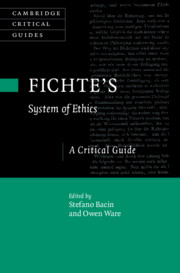Book contents
- Fichte’s System of Ethics
- Cambridge Critical Guides
- Fichte’s System of Ethics
- Copyright page
- Contents
- Contributors
- Acknowledgments
- Abbreviations and Translations
- Introduction
- Chapter 1 Fichte’s Ethics as Kantian Ethics
- Chapter 2 Fichte on Normativity in the Late Jena Period (1796–1799)
- Chapter 3 Fichte on Autonomy
- Chapter 4 Feeling, Drive, and the Lower Capacity of Desire
- Chapter 5 Fichte and the Path from “Formal” to “Material” Freedom
- Chapter 6 Fichte on the Content of Conscience
- Chapter 7 Fichte’s Theory of Moral Evil
- Chapter 8 Embodiment and Freedom
- Chapter 9 Ethics as Theory of Society
- Chapter 10 My Duties and the Morality of Others
- Bibliography
- Index
- Cambridge Critical Guides
Chapter 5 - Fichte and the Path from “Formal” to “Material” Freedom
Published online by Cambridge University Press: 20 May 2021
- Fichte’s System of Ethics
- Cambridge Critical Guides
- Fichte’s System of Ethics
- Copyright page
- Contents
- Contributors
- Acknowledgments
- Abbreviations and Translations
- Introduction
- Chapter 1 Fichte’s Ethics as Kantian Ethics
- Chapter 2 Fichte on Normativity in the Late Jena Period (1796–1799)
- Chapter 3 Fichte on Autonomy
- Chapter 4 Feeling, Drive, and the Lower Capacity of Desire
- Chapter 5 Fichte and the Path from “Formal” to “Material” Freedom
- Chapter 6 Fichte on the Content of Conscience
- Chapter 7 Fichte’s Theory of Moral Evil
- Chapter 8 Embodiment and Freedom
- Chapter 9 Ethics as Theory of Society
- Chapter 10 My Duties and the Morality of Others
- Bibliography
- Index
- Cambridge Critical Guides
Summary
This chapter deals with Fichte’s distinction between “formal” freedom and “material” freedom, on which hardly any interpretive consensus has been reached. The chapter argues that formal freedom is characteristic of the unconditioned, spontaneous activity of the I as such, that is, of the “pure I”: it underlies and makes possible both the freedom of conscious reflection and the freedom of practical willing and acting, including the freedom to determine not only the means toward one’s ends but also these ends themselves. The latter constitutes full material freedom. However, these two senses admit of different degrees, and Fichte himself is committed to the view that reaching full material freedom depends on a process of ongoing cultivation. In this process, the chapter argues, one achieves concrete material freedom of choice only by reflecting upon one’s own underlying formal freedom as an I.
Information
- Type
- Chapter
- Information
- Fichte's System of EthicsA Critical Guide, pp. 85 - 108Publisher: Cambridge University PressPrint publication year: 2021
